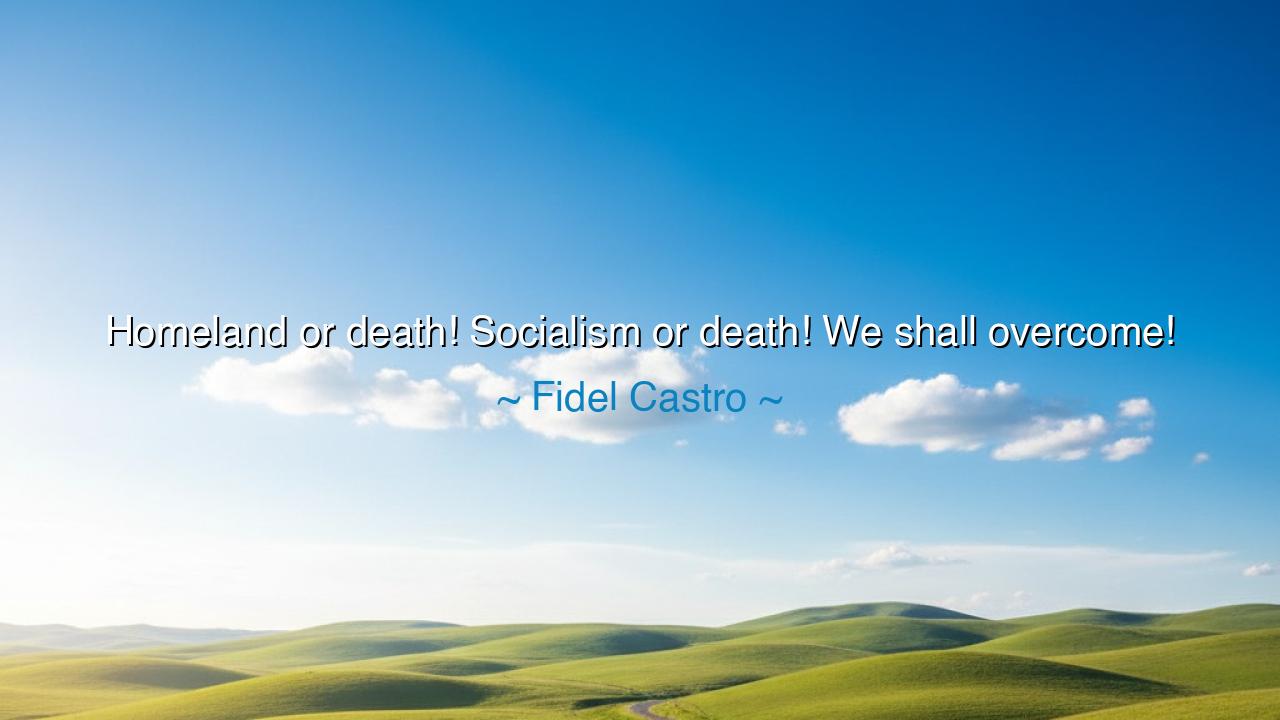
Homeland or death! Socialism or death! We shall overcome!






The words of Fidel Castro, thundering from the heart of revolutionary Cuba, echo like a war cry that refuses to fade: “Homeland or death! Socialism or death! We shall overcome!” These are not the quiet musings of a philosopher, but the fiery proclamation of a man who stood face to face with empire, surrounded by enemies and impossibilities, and still declared faith in victory. In these words, we hear not only the voice of a leader, but the heartbeat of a people—defiant, wounded, and unyielding. It is the ancient spirit of those who, throughout history, have chosen freedom over fear, principle over comfort, and honor over survival.
To understand this cry, one must see its birth in the furnace of revolution. Fidel Castro, son of a small island long oppressed by foreign powers, rose to lead a rebellion against tyranny and imperialism. The cry of “Homeland or death!”—in Spanish, “Patria o muerte”—was not born in comfort but in struggle. It was first spoken in the early years of revolutionary Cuba, as the nation stood defiant against invasion, embargo, and isolation. Castro’s words bound together a people who refused to bow to the giants of the world. To him, the homeland was not merely soil—it was identity, dignity, and destiny. To die for it was not tragedy, but fulfillment.
The second half of his declaration—“Socialism or death!”—reveals the ideological fire that guided his cause. To Castro, socialism was not just an economic theory, but a moral stance—the belief that no human should live enslaved by poverty or inequality. To choose socialism, in his eyes, was to choose humanity; to reject it was to embrace oppression. Thus, “Socialism or death” became more than a slogan—it was a vow, a covenant of faith in the possibility of justice, even at the cost of life itself. In this, his words resemble those of the prophets and warriors of old who declared that some things are worth dying for because they are greater than the self.
The final phrase, “We shall overcome,” joins his cry to the broader human struggle for liberation. It was a bridge between Cuba’s revolution and the many revolutions of spirit rising across the world—echoed in the hymns of the oppressed, from the plantations of the American South to the streets of Africa and Asia. Though the phrase itself carried the cadence of spiritual resistance, Castro’s use of it was not merely political—it was transcendent. It proclaimed that even when victory seems impossible, faith in the cause is itself a form of triumph. For those who believe in justice, there can be no defeat, only delay.
Yet beyond its political meaning, this cry holds a deeper, timeless truth. Every generation faces its own version of “Homeland or death.” For some, the homeland is literal—a nation under threat. For others, it is symbolic—the home of the soul, the moral ground one refuses to abandon. To live without integrity is a kind of death, just as to die with honor is a kind of immortality. Castro’s words remind us that the measure of a person, or a people, lies not in how long they live, but in what they are willing to die for.
History has seen many who embodied this same spirit. Consider Leonidas of Sparta, who, with three hundred warriors, stood against a sea of invaders, declaring that freedom was worth every drop of blood. Or Simón Bolívar, who crossed mountains and endured exile to free South America from colonial rule. Like them, Castro’s defiance sprang from the conviction that the human will, once awakened, is mightier than armies. Such words are not gentle—they are forged in struggle—but they remind us that the flame of conviction burns brightest in darkness.
Lesson and Practice:
The call of “Homeland or death! Socialism or death! We shall overcome!” is not limited to Cuba or to politics. It is a call to live with conviction. To fight for what is right, even when the odds are impossible. To love your homeland—whether it be your country, your people, or your principles—so deeply that you will not betray it for comfort or fear. Let your words and actions flow from purpose, not convenience. Stand firm when others waver, and serve not for reward, but for truth. For the victory of the just may be slow, but it is certain. And as long as courage endures in the human heart, the cry of Castro will remain alive in all who dare to believe: “We shall overcome.”






AAdministratorAdministrator
Welcome, honored guests. Please leave a comment, we will respond soon